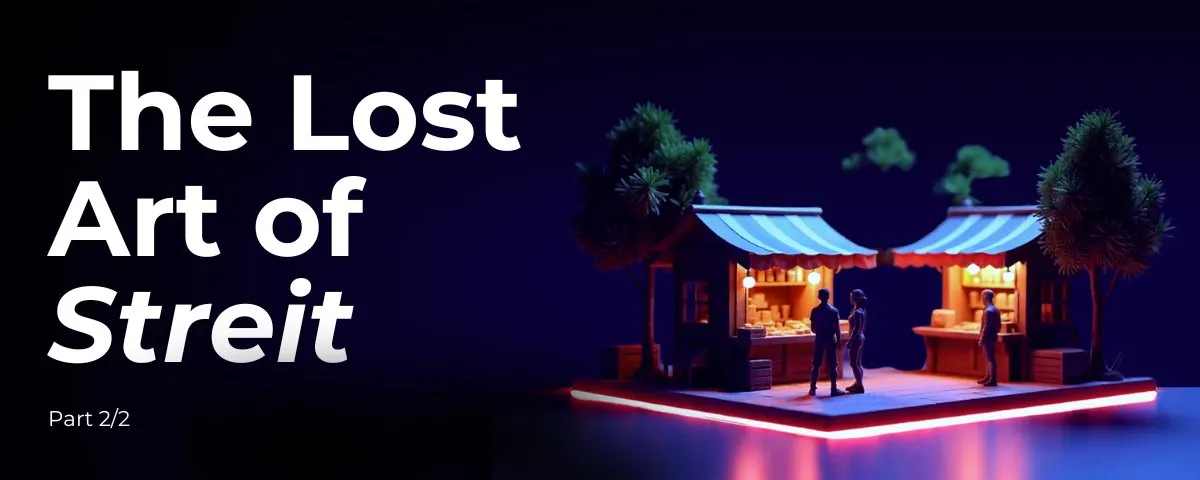
This is the second part of a two-part series. Read the first post here
It’s 1993 and a heated debate erupts at a local bar. The topic: whether the new highway bypass would save the struggling downtown or kill it entirely. For weeks, farmers, shopkeepers, teachers, and factory workers argued passionately across the same tables. No consensus emerged, but something more valuable did: relationships forged through disagreement, each side gaining insight into concerns they hadn’t considered.
Today, that coffee shop is a drive-through chain. The farmers, factory workers and teachers live in different zip codes. Their children attend different schools. And if they disagree about highways - or vaccines, or elections for that matter - they do so in separate digital spaces, engaging with entirely different social circles. What happened to these spaces - and the conversations they once hosted - is at the heart of our current crisis.
We aren’t disagreeing less than previous generations, we’re disagreeing worse. The public spaces that once forced diverse interaction - town squares, weekend markets, local sports events - have given way to private, commercial environments optimized for convenience and comfort, not conversation.
Our digital lives intensify this filtering. Recommendation algorithms don’t just predict what we’ll like—they shape what we see and who we interact with. Studies show that content triggering outrage spreads up to six times faster than other emotions, creating incentives for inflammatory rather than thoughtful engagement. The business model of most digital platforms accelerates these problems. When revenue comes primarily from advertising, success is measured in screen time. This creates powerful incentives to maximize engagement – often through content that triggers strong emotional responses, particularly outrage.
Contrary to popular belief, the problem doesn’t seem to be “filter bubbles” in the traditional sense. Research by Meta surprisingly revealed that social media actually increases exposure to diverse viewpoints by about 26% compared to pre-internet media consumption (https://archive.ph/qKux2#selection-589.0-593.774). The real issue? This increased exposure often deepens polarization rather than reducing it.
When we encounter opposing views in hostile, tribalized contexts, we don’t reconsider our positions – we double down on them. Andrew Bosworth, a longtime Meta executive, phrased it: “Whatever your political leaning, think of a publication from the other side that you despise. When you read an article from that outlet… does it make you rethink your values? Or does it make you retreat further into the conviction of your own correctness?”
Political scientist Robert Putnam’s research revealed a troubling pattern: in environments with increasing diversity but without shared spaces for meaningful engagement, people across all demographics tend to “hunker down.” Trust declines across the board – even within one’s own group. The number of close friendships decreases, and community cooperation becomes rarer.
These findings point to a critical insight: mere exposure to difference without the right context destroys rather than builds solidarity. Without frameworks that turn conflict into connection, we retreat into tribal safety.
We face challenges that demand collective intelligence – climate change, technological disruption, democratic instability – yet we’ve lost the foundational skill that makes collaboration possible: the ability to engage meaningfully across difference. If we wish to recover our capacity for meaningful disagreement, we need to rebuild not just our attitudes, but the environments that once made Streitkultur possible.
What would new digital spaces designed for productive conflict look like? They would need to:
Contro is pioneering such a space through debate markets where participants back their convictions with real tokens, creating an intellectual marketplace where quality thinking earns both recognition and reward. Ideas rise to prominence based on merit, and expertise becomes a tangible advantage. The result is a community that celebrates both rigorous thinking and spirited competition, making the quest for collective understanding not just efficient and rewarding, but genuinely enjoyable.
As Thomas Jefferson wrote when founding the University of Virginia: “For here we are not afraid to follow the truth wherever it may lead, nor to tolerate any error as long as reason is left free to combat it.”
History’s most important breakthroughs began with passionate clashes where ideas were tested in the crucible of challenge. This is the essence of Streit – a vital energy that propels human understanding forward.
As we face unprecedented challenges that demand multiple perspectives and the wisdom of the many, our most urgent task lies in reviving conflict – transformed through better structures into the powerful engine of progress it was always meant to be.